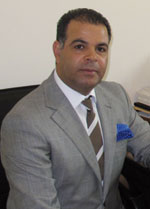
|
 |
 |
|
|
|
|
|
|
|
|
|
|
|
|
|
|
|
|
|
|
|
|
|
|
BBC: “Are Police Reforms Genuine or Superficial”Hasan Moosa Shafaei
The BBC broadcasted a lengthy programme with regards to the reforms in the police, entitled ‘Bahrain: Are Police Reforms Genuine or Superficial’. The Programme was distinguished and very effective and was well received by human rights organizations concerned with Bahrain. The Programme was discussed by many writers, journalists and was a source of debate among the Bahraini citizens themselves. I would like to offer some general observations on the report from a political and human rights perspective: Firstly: the Government should be commended on its transparency in allowing the BBC to visit and officials to participate and answer raised questions and for allowing opposition figures as well as the public to voice their opinions. Such a positive approach should be the norm in dealing and interacting with the international community, whether governments, NGOs or the media, as it allows Bahrain, in the medium and long terms, to generate more understanding and appreciation of the overall dimensions of its current crisis and the prospects of its future stability. Secondly: the Programme can be described as reasonably balanced in its presentation and reflection of the different points of views which makes it rather unfair to accuse it of being excessively harsh on the Bahraini Government. It also gave both parties the opportunity to present their opinions without being seen overly inclined towards siding with one party or the other. The Programme positively presented the establishment of the Ombudsman’s office as an unprecedented development in the region. Thirdly: In my opinion, the pivotal point in the BBC’s report, upon which the success of the police work could be measured, is the issue of holding accountable those who have committed human rights violations. However, the Programme produced nothing new regarding the main concerns of human rights institutions. No country is immune from the occurrence of Human rights violations, but the testing point, as far as the respect for human rights is concerned, centres on whether the perpetrators of these violations would be held accountable or not . This issue should be treated with great care and consideration if we are to persuade the International Community to acknowledge the progress we have made and the positive steps we have taken. Fourthly: the reassurance of the Minister of Justice regarding putting an end to the culture of impunity, and the statements made by the Chief of Public Security about the police reforms and the pledges of the Chairmen of the Ombudsman’s Office regarding the investigation of all allegations of Human Rights violations, should all be commended. However, it is important to realise that these statements would not be enough if they were not supported by documented cases that would prove beyond doubt that justice has really been served. The international human rights community acknowledges action and achievements on the ground rather than promises of future action. In this respect, all relevant officials should be in possession of detailed information on all actions and procedures taken regarding any allegations of actual or perceived violations raised by individuals or local or foreign entities, so they can be better equipped to promptly respond with documented evidence to any criticism or allegations. Fifthly: The BBC’s report reflected the level of mistrust between the public and Government’s human rights institutions which was manifested in the reluctance of some individuals to report alleged violations committed against them or their children. This is a real problem that concerns, not only the citizens, but more importantly the State itself. The Government should work hard towards regaining public trust and confidence in its apparatus. This lack of trust weakens the State and encourages the public to report their grievances to human rights organizations and UN institutions abroad. Finally, Consolidating the principle of transparency in addressing all the aspects connected to the issue of the allegations of torture, and adopting an objective and scientific methodology when dealing with criticism, no matter how harsh, will go a long way in enhancing credibility and restoring the shattered mutual trust. There is possibly a political message embedded in the report that was debated by the public along two different points of view: some thought that the Programme’s aim was to highlight the British involvement in the efforts to develop Bahraini police, while others suggested that the objective of the Programme was to send a mild critical message regarding the shortcomings and the delays in reforming the police. |
